Hedgehog engine 1¶
Texture types¶
Hedgehog Engine 1 games limit themselves to a few texture types (with exceptions), which can make configuring materials difficult, as many shaders use certain types differently than what their name suggests.
Here is a list of all texture types and how they are most commonly used:
Type |
Primarily used with |
Occasionally used with |
|---|---|---|
diffuse |
||
opacity |
||
reflection |
/ |
|
specular |
||
gloss |
||
normal |
/ |
|
displacement |
General use texture type |
File formats and encodings¶
Textures are always stored in DDS files, of which the vast majority use some form of block-compression encoding. Only a handful are not compressed.
Since HE1 is programmed with Direct3D 9, the number of available block compression encodings is limited to BC1, BC2 and BC3.
More info on DDS block compression can be found here.
Note
The Direct3D 11 mod for Sonic Generations (PC) by Skyth makes the game run on Direct3D 11, which can read newer DDS encodings like BC4, BC5, BC6, BC7 and more.
Kinds of textures¶
The majority of textures used by materials are one of the following kind of textures.
Diffuse¶
Reference
- File suffix:
_dif- Composition:
RGBA- Recommended encoding:
BC1_UNORMwhen opaqueBC3_UNORMwhen transparent
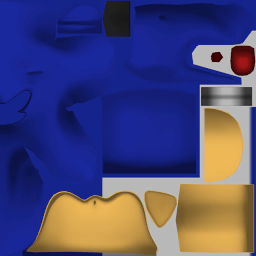
chr_sonic_body01_dif_HD.dds from Sonic Generations¶
Diffuse textures are color-transparency textures that are sampled directly for the base color of a material.
Opacity¶
Reference
- File suffix:
_alp,_a, Often none- Composition:
Grayscale- Recommended encoding:
BC1_UNORM
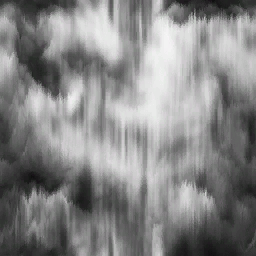
csc_etc_ty1_wind01_alp.dds from Sonic Generations¶
Opacity textures determine the transparency of a material.
Usually transparency is relayed to Diffuse textures, and actual opacity textures are only used when special alpha compositing happens.
Falloff¶
Reference
- File suffix:
_fal- Composition:
Color- Recommended encoding:
BC1_UNORM
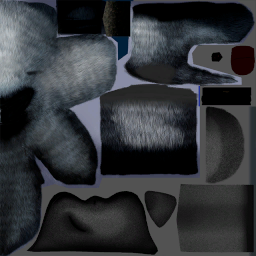
chr_sonic_body01_fal_HD.dds from Sonic Generations¶
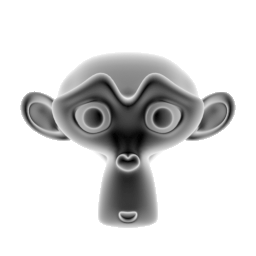
A camera rotating around Suzanne with a raw falloff factor. The diffuse texture is black, and the falloff texture is white¶
Falloff textures change the color of the diffuse texture based on the viewing angle: The greater the angle between the camera and the surface of the model, the greater the influence.
Depending on the shader, the falloff color either gets mixed with the diffuse color or added to it.
Additionally, shaders with falloff colors or textures basically always come with a parameter that controls how the falloff factor gets calculated.
Environment map¶
Reference
- File suffix:
_ref,_env,_cube- Composition:
RGBA- Recommended encoding:
BC1_UNORMwhen opaque,BC3_UNORMwhen transparent
Environment textures are used to project a fake reflection of the surroundings onto a model based on the viewing angle.
Some get layered on top of e.g. a diffuse texture, and have an alpha channel for their layer-transparency.
Depending on the shader, these have 3 different layouts:
Cubemap¶
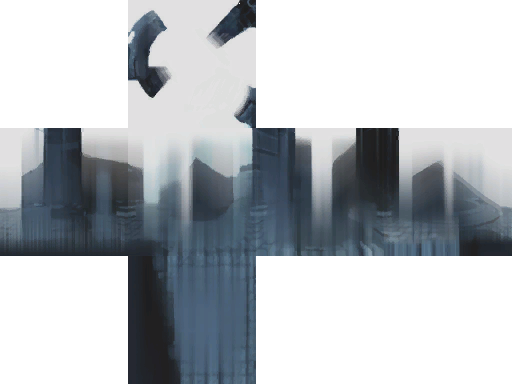
chr_sonic_white_ref.dds from Sonic Unleashed¶
The most detailed, and probably best known type of reflection map. Uses 6 square areas, one for each side of a cube, to represent reflections from each axis.
Spherical environment map¶
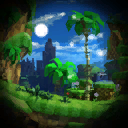
ghz_obj_kk1_giant_batabata_body_ref.dds from Sonic Generations¶
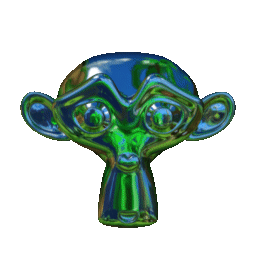
A camera rotating around Suzanne with a spherical environment map¶
The cheapest type of reflection, which always directly faces the camera.
Also known as MatCap textures.
Dual paraboloid environment map¶
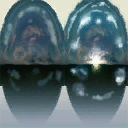
ghz_metal_yy1_sky_ref.dds from Sonic Generations¶
Effectively a full skybox composed of 2 spherical environment maps that cover the front and back of an environment.
Covers the same area as a cubemap but with less detail.
Emission¶
Reference
- File suffix:
_ems,_lum- Composition:
Color- Recommended encoding:
BC1_UNORM
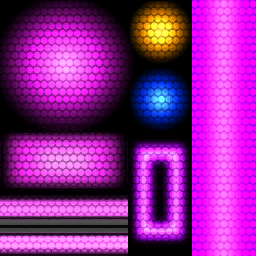
boss_timeeater_light_ems_HD.dds from Sonic Generations¶
Emission textures make parts of a model emit light.
Specular¶
Reference
- File suffix:
_spc- Composition:
RGBA- Recommended encoding:
BC3_UNORM
Specular textures contain 2 different maps:
The blinn phong lighting specular color in the RGB channels
The environment map (reflection) influence in the alpha channel
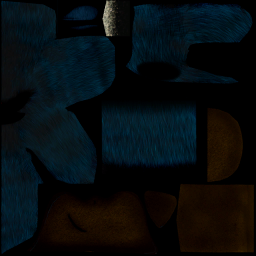
The color component of chr_sonic_body01_spc_HD.dds from Sonic Generations¶
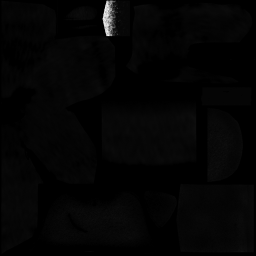
The alpha component of chr_sonic_body01_spc_HD.dds from Sonic Generations¶
Gloss¶
Reference
- File suffix:
_pow- Composition:
Grayscale- Recommended encoding:
BC1_UNORM
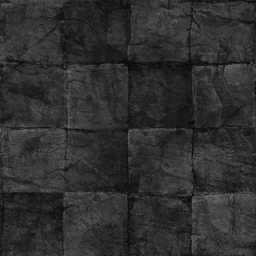
ghz_rock_sk1_wall01_pow.dds from Sonic Generations¶
Gloss textures determine the blinn phong lighting specular power.
Note
Almost every Hedgehog Engine 1 game calculates the gloss factor differently, which may cause the same gloss texture to look different in each game.
Normal map¶
Reference
- File suffix:
_nrm(rarely_norm,_nor,_nml)- Composition:
Color- Recommended encoding:
BC1_UNORM

ghz_rock_sk1_wall01_nrm.dds from Sonic Generations¶
Normal map textures are used for faking bumps and dents on a model to affect lighting, falloff, environment maps and similar.
Note
Compared to blender, the green channel is inverted. This gets adjusted on import/export.